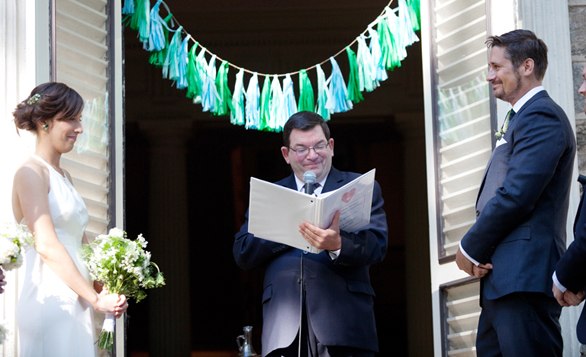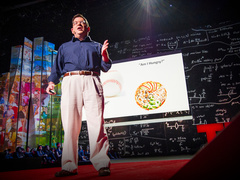
Sex educator Al Vernacchio spends his weekends officiating weddings. Photo: courtesy of Vernacchio
Editor’s note: In today’s talk, Al Vernacchio offers a new metaphor for thinking about sex — ordering a pizza. Outside of his Philadelphia-area classroom, where he works as a sexuality educator for high-school students, Vernacchio also serves as a marriage officiant. With weddings on our minds this summer, we asked him to share his thoughts on his two interrelated callings.
By Al Vernacchio
In addition to my work as an educator, I have presided at some 40 weddings since joining the wonderful Philadelphia-based organization Journeys of the Heart in 2010. Being both a wedding officiant and a sexuality educator is somewhat like the experience Jill Bolte Taylor describes in her famous TED Talk, where she speaks so eloquently about the two sides of the brain and how they pull us toward different realities. I, like so many others, have been captivated by Dr. Taylor’s talk and have watched it over and over. I always walk away thinking about how it’s possible, and necessary, to hold two seemingly disparate realities in my head at the same time.
When the wedding officiant part of my brain is engaged, I feel a lot like Mary Poppins. I sweep into a couple’s life at a pivotal moment, cheerfully share a lovely and loving peak experience with them, and, as they head to their reception, I open up my umbrella and float away, leaving them to their happily ever after. When the sexuality educator part of my brain is engaged, I feel more like John Keating, Robin Williams’ character in Dead Poets Society. I’m hoping to inspire new ways of thinking about rather traditional ideas, respectfully but with conviction.
There are times, performing weddings, when the Mary Poppins side and the John Keating side of my brain work well together. They both care deeply about their charges. They both have the ability to develop surprisingly intimate relationships with others in a relatively short time. When you help a couple plan their wedding, you see a lot of their hopes, their joys, and even their fears. You are privy to their life and love stories in a special way, and you help shape those stories into the kind of ceremony they want. I always tell couples that my job on their wedding day is to make them look good. That can be as simple as gently moving them into place so their photographer gets a great shot, or relieving their stress by having them repeat their vows after me so they don’t have to memorize them. It’s reminding them to enjoy themselves at the ceremony, making them laugh a little, and being flexible enough to handle whatever may happen. When their unity candle blows out after they’ve lit it, or the butterflies they want released at the ceremony’s end turn up mostly dead, or when someone has to run back to the bridal suite to get the rings during the ceremony, I tell the assembly it’s a sign of great blessing upon the couple. A spoonful of sugar offered with the authority of a teacher makes it true in that moment — and everyone smiles and relaxes.
 Al Vernacchio: Sex needs a new metaphor. Here's one ...
But when the wedding officiant and sexuality educator parts of my brain come into conflict, it’s a real slugfest. For me, sexuality education is social justice education. Both are about creating equity and overcoming oppression. Even the briefest foray into the history of marriage makes clear that, for most of its historical existence, it wasn’t about equity, especially gender equity. Some of our modern marriage traditions still smack of that, and while my Mary Poppins brain wants to play nice and let it slide, my John Keating brain has a hard time biting his tongue.
Al Vernacchio: Sex needs a new metaphor. Here's one ...
But when the wedding officiant and sexuality educator parts of my brain come into conflict, it’s a real slugfest. For me, sexuality education is social justice education. Both are about creating equity and overcoming oppression. Even the briefest foray into the history of marriage makes clear that, for most of its historical existence, it wasn’t about equity, especially gender equity. Some of our modern marriage traditions still smack of that, and while my Mary Poppins brain wants to play nice and let it slide, my John Keating brain has a hard time biting his tongue.
Weddings are an amazing study in gender, and sometimes an amazing study in sexism. One place this rears its ugly head is when a couple insists on having a male officiant perform their ceremony, despite the fact that our organization has both male and female officiants. Sometimes a couple says a male-only request is important to their parents or grandparents, but that’s no less disheartening to me. In my first meeting with a couple, I always show them the group photo of all our officiants and make it clear that if they don’t think I’m the right person for them, there are many other choices. Somehow I always happen to highlight one of the female officiants, and the John Keating part of my brain smiles.
My sexuality educator brain always wants to remind couples that marriage is no longer a transfer of property (meaning: the bride), so we can skip the part when the bride’s father “presents” her to the groom. In my snarky moments alone in the car, I call it “the old football hand-off.” Instead, I love to start the ceremony by inviting the bride’s family to welcome the groom and inviting the groom’s family to welcome the bride. Lovely. Simple. Equal.
Another place where gender inequity creeps in is when grooms tell me, “I’m just along for the ride; whatever she wants is fine.” Sometimes what that really means is, “Weddings are for women. I’ll show up and do my part.” How sad! I totally understand how important a wedding can be for a bride, but I always hope it’s just as important for the groom. What if we raised our sons, as well as our daughters, to dream of their wedding day?
The place where my wedding officiant brain and my sexuality educator brain really break into a West Side Story-inspired rumble is over whether and how to make couples aware that, while I am assisting them in becoming legally wedded spouses, I can’t access that same privilege myself yet. It’s not that I’ve no one to walk up the aisle with. I found my lifelong sweetheart over 19 years ago. He’s a tall, self-assured, adorable, incredibly talented classical pianist. He has the most beautiful ice-blue eyes I’ve ever seen, and the goofiest laugh I’ve ever heard. We exchanged hearts a long time ago and set about creating a life together — a life that in our state of residence isn’t legally sanctioned or recognized, despite the recent Supreme Court DOMA and Prop. 8 decisions.
Now this isn’t a “woe is us” tale at all. My life with my sweetheart is pretty amazing and pretty indistinguishable from most of our heterosexual married friends’, except when you get down to the nitty-gritty details of taxes and inheritance law and that marriage license which conveys over 1,000 federal benefits and hundreds of state benefits. That’s the same license my signature authenticates for the couples whose weddings I officiate.
In all my time performing weddings, I’ve never met a couple who talked about getting married for the sake of the legal benefits. They get married because they’re in love, and because they want to acknowledge that love publicly in front of their families and friends. But I’m sure they’re aware that marriage conveys legal benefits, and I wonder if marriage would mean the same thing to them if it didn’t? I’ve only had one couple so far (and I’m proud to say the bride was a former student of mine) who specifically wanted to take a moment during their ceremony to acknowledge that legal marriage is not a privilege open to all, and to ask the assembly to pray and work for the day when it would be. This wasn’t just because they knew I was gay; the groom’s brother, who was also his best man, was gay. It’s easy to bring up adding this language to a ceremony when the couple initiates it, but boy does Mary Poppins want me to shut up when they don’t!
Ultimately, I always recognize that I am at the service of two people whose happiness I value and whose relationship I am rooting for. It’s really up to them which traditions to follow and which officiant they want. Most times they want Mary Poppins. Once in a while they want John Keating. In either case, they get both — because that’s just who I am.
Comments (2)